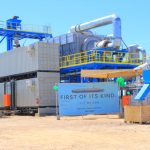Hyphen Hydrogen Energy (Hyphen), in collaboration with the Namibia Investment Promotion and Development Board (NIPDB) and the Namibia Chamber of Commerce and Industry (NCCI), has embarked on visits to various destinations across the country to meet with businesses as part of efforts to unlock opportunities for local businesses in Namibia’s new green hydrogen sector.
The Local Content Roadshow (LCR) saw Hyphen, NIPDB and NCCI, visit the towns of Swakopmund, Oshakati, and Lüderitz, between 27 February and 27 March, where over 200 businesses participated in the first series of business sessions. Hyphen showcased procurement and employment opportunities for local businesses, with the company targeting 30% local procurement for goods, services, and materials.
Value Chain Mapping
Hyphen has undertaken a comprehensive value chain mapping study of 13 critical engineering infrastructure components that comprises the majority of the Hyphen project, highlighting exactly where local businesses can get involved in the project and where constraints within the local market exist. These include Wind, Solar, Battery Energy Storage Systems (BESS), Electrolysis, Transmission, Roads, Green Hydrogen (GH2) Pipeline, Water (H2O) Pipeline, Ammonia (NH3) Synthesis, NH3 Storage, NH3 Export, Desalination, and Air Separation.
Hyphen Senior Economic Development Manager (Procurement), Johannes Shipepe, told Etango that as part of its local content target in the Feasibility and Implementation Agreement (FIA), Hyphen has set a target to spend 30% of its procurement on local companies to provide goods and services during the construction and operations phase.
“The purpose of these engagements is to share more information around what the potential opportunities are that can be provided by local companies. We targeted to engage local companies, suppliers and service providers that are currently involved in or looking to get involved in, the supply chain and construction of the renewable energy or green hydrogen industries. This is also a good opportunity for associations and business chambers to access information that they can share with their members,” said Shipepe.
Physical and Virtual Engagements
Hyphen is planning additional physical engagements across Namibia, with details to be released in due course. In addition to the physical engagements, Hyphen will be undertaking a series of virtual, social and print media engagements in order to reach as many potential service providers as possible.
“We will be collaborating with various partners and stakeholders to rollout some of the engagements,” said Shipepe.
Baseline Study Early Opportunities Identified
Hyphen has also been using the LCR to share the initial results of a baseline study investigating potential local content opportunities for Namibian businesses to participate in the project. The mapping is needed to identify “local content packages” by assessing i) the value of potential opportunities against ii) the level of specialisation required for each component. Hyphen recognises that “low-hanging opportunities” within this emerging sector typically fall within the low to medium levels of specialisation, which given the scale of the project, can deliver significant value for local businesses.
Shipepe said some of the positive findings of the baseline study are that Namibia has strong existing construction, mining and transport and logistics industries – which industries have resulted in the development of a strong base of suppliers. With this strong base, the general and civil construction, transport and logistics services were some of the early opportunities where local content participation can be optimised. This includes other associated services such as heavy plant and equipment services, concrete works, electrical and mechanical works, and crane services.
“We also see significant opportunities in the solar industry given Namibia’s good experience in construction of solar plants. Given the scale of Hyphen’s project, the challenge for local suppliers will be their ability to scale up their capacity to provide services at a massively larger scale than the projects that they have been involved with in the past,” Shipepe said.
The Hyphen project, Namibia’s first gigawatt-scale green hydrogen project, aims to produce 2 million tonnes of green ammonia annually, utilising 7GW of renewable energy and 3GW of electrolyser capacity.
Hyphen anticipates that due to Namibia’s small manufacturing base, most of the construction equipment and technology will most likely be imported, which also presents a good opportunity to explore ways to develop local capacity.
“In our case, we aim to build local capacity through our Enterprise and Supplier Development program where we will be providing support to local companies build their capacity and readiness to supply goods and services,” Shipepe said.
More Awareness Needed
“Some of the participants were interested to understand when the process of supplier onboarding will start and what they can do now to ready themselves. They also urged us to ensure that the process of creating awareness on the capacity development and procurement opportunities to be done in an open, fair, and transparent manner. All of which we will take into consideration as we finalise the development of the project,” the Hyphen senior manager said.
The NCCI acknowledged the challenges to entry that particularly Micro, Small, and Medium Enterprises (MSMEs) face. In response to these insights, Hyphen shared an initial vision for actively involving MSMEs in the project through its proposed Enterprise and Supplier Development Program, which will see MSMEs working in partnership with larger contractors to execute identified work packages. .
“Hyphen is committed to ongoing communication with the local business community and we look forward to continuing with the LCR. We want to ensure that we have a transformational and positive impact on local businesses, job creation, training, and education across Namibia and so we truly appreciate the participation we have seen so far. We would urge local businesses to keep an eye out for upcoming sessions,” said Toni Beukes, Head of ESG at Hyphen. Claudia Capelao, NIPDB Manager of MSME Ecosystem Optimisation, said: “The green hydrogen industry, like the broader energy sector, requires scale, quality, and innovation. For MSMEs working on large commercial projects, collaboration is not optional, it is imperative. That’s why we are out on the road, engaging with businesses to help them understand how to prepare to make the most of the opportunities that green hydrogen presents.”






